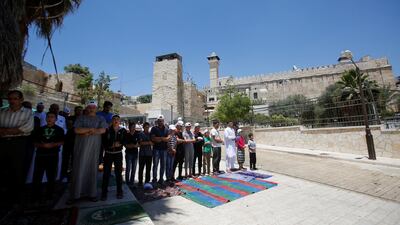The decision by Unesco to list the old city of Hebron in the occupied West Bank as a world heritage site has, unsurprisingly, prompted a game of emotional and financial blackmail by Tel Aviv.
Twelve states on the World Heritage Committee voted in favour of the resolution and only three voted against it, despite the intensive diplomatic war waged by Israel and the United States in recent weeks.
No sooner did the decision emerge than Israeli prime minister Benjamin Netanyahu took to social media to condemn the move as "anti-Jewish" and reduced the UN membership fees contributed by his country by $1 million (Dh3.6 million). This is the latest cut in funds to the UN by Israel in a very short period. Following the Unesco resolution in May condemning Israeli policy in Jerusalem and Gaza, Mr Netanyahu vowed to slash funding by a similar amount. In April, in response to a UN Human Rights Council resolution against illegal Jewish settlements, Mr Netanyahu cut contributions by $2 million.
If anything, it reinforces the fact that Israel categorically refuses any international measure that may inadvertently or consciously reinforce Palestinian identity and statehood.
The question of Hebron is even more contentious than the successful 2012 bid to place Bethlehem’s Church of the Nativity on the Unesco list. While the latter is seen as more universal, the former touches on Israel’s ideological premise of owning that which they deem first and foremost Jewish.
The Tomb of the Patriarchs, known as the Ibrahimi Mosque, is a sacred place for Muslims, Jews and Christians. Many believe it is the burial place of Jacob, Abraham and Isaac.
Regardless of Israel’s course of action, the decision was yet another symbolic victory for Palestinian self-determination. The UN General Assembly had previously voted to accord Palestine non-member observer state status, much to Israel’s dismay.
All this points to the fact that the UN recognises the diplomatic battle that Palestinians are faced with day after day, while also understanding the significance of the city of Hebron.
But that still has not stopped Israel from using its usual tactics of politicising what is otherwise a cultural issue and of complaining when the status quo is disrupted in even the smallest way against them. They do so even as they seek to change facts on the ground through the daily misery of the occupation and through the grinding progress of illegal settlement building. In an intractable and long-running battle, Unesco's recognition is, at least, a move in the right direction for Palestinians.

